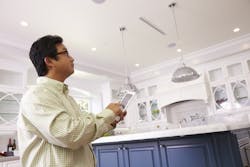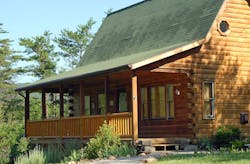Over the past 18 months, the world changed at a staggering pace. During the COVID-19 pandemic, technology that, in the past, may have been adopted over a period of months or years was implemented seemingly overnight. Nowhere was this more evident than in the residential market as homes evolved from places to live and relax, as well as where we work, study, learn, watch first-run movies, and more.
It appears this trend will continue even as the pandemic evolves: a FlexJobs survey from May shows 96% of workers desire some form of remote work, and 65% of respondents report wanting to be full-time remote employees post pandemic. In a September “deep dive” survey by CEPRO, integrators report almost half (47%) of their residential projects included lighting controls, lighting fixtures, and/or motorized shades. They also saw a 44% increase in the number of residential lighting projects over the past year.
Electrical contractors have an opportunity to expand their business into the residential market – or to grow their residential business if they’re already in it. Here are the top residential lighting trends for electrical contractors to watch in the new year and beyond:
1. Wireless Lighting Solutions
Even before the pandemic, we were seeing a switch to wireless lighting in commercial spaces. The same benefits that make wireless solutions desirable for facility owners and managers also make it an ideal choice for residential clients: It’s flexible, scalable, and requires less time and cost to install. Residential wireless solutions allow homeowners to add a second wireless switch anywhere they need it without the disruption of cutting holes, pulling wire, or installing an electrical back-box. Electrical contractors just replace the single pole switch with a smart dimmer and mount a remote with adapter and wall plate. .
2. Labor Shortages
Wireless solutions address the ongoing labor shortage plaguing electrical contractors. Even before COVID-19, finding skilled workers could be challenging. Because wireless is easier and faster to install, you can do more with the team you have.
3. Smart Lighting
Smart lighting for the home is another feature more and more customers are seeking. Lighting can help set the mood of a space and is increasingly easier to control through remotes, voice control, and apps. Smart, networked lighting solutions allow residential space to evolve at the touch of a button or a voice command: the den becomes an office; the dining room transitions from class to dinner party; the family room becomes your customer’s personal theater.
4. Vacation Homes
Another opportunity for residential electrical contractors is helping customers light second homes. Sales of vacation homes rose by 16% in 2020 over 2019, and the trend is continuing this year with sales up 33%. How can homeowners keep their home base safe when they’re at the vacation home? And vice versa? Electrical contractors can help by educating their customers about smart lighting solutions so homeowners are never in the dark, whether they’re home or away. The ideal smart lighting solution should have an easy-to-use app that doesn’t require extensive client training so homeowners can change and add schedules as their needs evolve.
5. Landscape lighting
Customers can increase curb appeal and safety with the right landscape illumination. With longer days and the outdoor season right around the corner, you can delight your customers with outdoor lighting control solutions that make their lives more pleasant and convenient. Smart lighting solutions allow homeowners to schedule lights to turn on sunset and off at midnight, for example.
The residential market opens new opportunities for electrical contractors to grow their business. Stay up-to-date on the top trends homeowners care about, and partner with trusted manufacturers who have a track record of providing outstanding products and services. Many manufacturers offer robust, user-friendly training programs to help you learn more so you can best serve your customers.
Joe Guellnitz is the Director of Product Management at Lutron Electronics.








